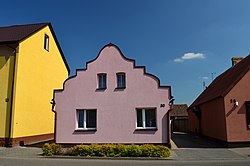Budzyń, Greater Poland Voivodeship
Budzyń | |
|---|---|
Town | |
 Colourful old houses in Budzyń | |
| Coordinates: 52°53′22″N 16°59′19″E / 52.88944°N 16.98861°E | |
| Country | |
| Voivodeship | Greater Poland |
| County | Chodzież |
| Gmina | Budzyń |
| Highest elevation | 110 m (360 ft) |
| Lowest elevation | 100 m (300 ft) |
| Population | |
• Total | 4,861 |
| Time zone | UTC+1 (CET) |
| • Summer (DST) | UTC+2 (CEST) |
| Vehicle registration | PCH |
| National roads | |
Budzyń [ˈbud͡zɨɲ] is a town in Chodzież County, Greater Poland Voivodeship, in west-central Poland. It is the seat of the gmina (administrative district) called Gmina Budzyń.[1] It lies approximately 12 kilometres (7 mi) south-east of Chodzież and 55 km (34 mi) north of the regional capital Poznań.
The town has a population of 4,861.
History
[edit]
Budzyń was granted town rights in 1458 by King Casimir IV Jagiellon. It was a royal town of the Kingdom of Poland, administratively located in the Poznań County in the Poznań Voivodeship in the Greater Poland Province.[2]
In September 1939, during the German invasion of Poland at the start of World War II, the German Selbstschutz carried out executions of several local Poles.[3] Also in September 1939, the Germans destroyed the local monument to Polish leader Józef Piłsudski.[4] Further executions of Poles from Budzyń, incl. the local school principal, priest, police chief and craftsmen and farmers, were committed in November 1939 in nearby Morzewo as part of the Intelligenzaktion.[5] In December 1939, the German police and Selbstschutz carried out expulsions of Poles, who were deported to the General Government in the more eastern part of German-occupied Poland, while their houses and farms were handed over to German colonists as part of the Lebensraum policy.[6]
Demographics
[edit]
|
| ||||||||||||||||||||||||||||||
| Source: [7] | |||||||||||||||||||||||||||||||
References
[edit]- ^ "Central Statistical Office (GUS) - TERYT (National Register of Territorial Land Apportionment Journal)" (in Polish). 2008-06-01.
- ^ Atlas historyczny Polski. Wielkopolska w drugiej połowie XVI wieku. Część I. Mapy, plany (in Polish). Warszawa: Instytut Historii Polskiej Akademii Nauk. 2017. p. 1a.
- ^ Wardzyńska, Maria (2009). Był rok 1939. Operacja niemieckiej policji bezpieczeństwa w Polsce. Intelligenzaktion (in Polish). Warszawa: IPN. p. 114.
- ^ Grochowina, Sylwia (2017). Cultural policy of the Nazi occupying forces in the Reich district Gdańsk–West Prussia, the Reich district Wartheland, and the Reich district of Katowice in the years 1939–1945. Toruń. p. 96. ISBN 978-83-88693-73-1.
{{cite book}}: CS1 maint: location missing publisher (link) - ^ Wardzyńska (2009), p. 200
- ^ Wardzyńska, Maria (2017). Wysiedlenia ludności polskiej z okupowanych ziem polskich włączonych do III Rzeszy w latach 1939-1945 (in Polish). Warszawa: IPN. p. 158. ISBN 978-83-8098-174-4.
- ^ Dokumentacja Geograficzna (in Polish). Vol. 3/4. Warszawa: Instytut Geografii Polskiej Akademii Nauk. 1967. p. 5.




